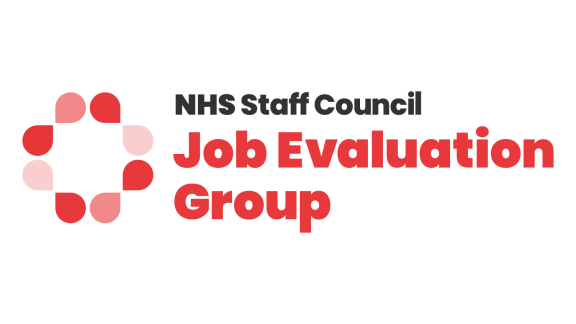Key points
The NHS Staff Council Job Evaluation Group (JEG) has reviewed and published this updated guidance to support ICBs in managing equal pay risks through the application of job evaluation practices.
This guidance was first published in February 2023 and reviewed in September 2025.
This guidance highlights the equal pay implications of service reconfiguration and the importance of ensuring that the principles and practices of the NHS Job Evaluation Scheme are used by organisations as they develop and implement new and revised job structures.
Background
The NHS Job Evaluation (JE) Scheme is the mechanism by which employers determine the pay banding of roles in a way that ensures equal pay for work of equal value. It underpins the NHS Terms and Conditions of Service Handbook and is fundamental in ensuring employing organisations mitigate the risk of pay inequality in their workforce.
This guidance is for integrated care board (ICB) employing organisations particularly those that have undergone organisational change or inherited legacy structures from predecessor bodies and complements the NHS Job Evaluation Group’s guidance note for the wider service on managing equal pay risk by ensuring good JE practice.
It is based on chapter 4 of the NHS Job Evaluation Handbook which draws on relevant legal decisions, good practice advice from the Equality and Human Rights Commission and experience of those who have been through similar exercises and covers the following:
- the equal pay implications of reconfigurations of service
- the importance of ensuring that the principles and practices in relation to the NHS JE Scheme are used by organisations as they develop and implement new and revised job structures.
This guidance should be read in conjunction with Annex 24 - Guidance on workforce reprofiling in the NHS Terms and Conditions Handbook.
An ICB that has contracted their JE work out to a commissioning support unit (CSU) under a service level agreement (SLA) arrangement will need to instruct and work with the CSU to ensure any potential equal pay risk arising from reconfiguration is mitigated as described in this document.
The equal pay implications of service reconfiguration
Following a merger or reconfiguration there will be a new single employer and employees of the merged organisation will be treated as being ‘in the same employment’ for the purpose of the Equality Act 2010 and the Equal Pay Act (Northern Ireland) 1970. This means it may be possible for employees of one of the legacy organisations to pursue equal pay claims, citing comparators from one of the other merging organisations.
Although the legacy NHS organisations should all have applied the NHS JE Scheme, there may be equal pay issues if there are significant differences in the way each constituent organisation has implemented it. Whilst the organisational change process for the establishment of ICBs was a TUPE or TUPE-like process, Tribunals will only make allowance for this as a mitigating factor for a limited length of time.
What should restructured organisations do?
To protect itself against claims, organisations should, at the earliest opportunity, review its job evaluation practices and scope out any work that will be necessary to ensure there is no risk of pay inequality. Where roles have changed or been brought in from other employing organisations, this may ultimately entail having to review and consistency check all legacy JE outcomes, revisiting and, if necessary, re-matching/evaluating where inconsistencies cannot be objectively justified. A project plan that helps to identify particular areas of concern or risk will be useful in prioritising resources. It will be important to ensure that all staff have an up to date job description and that JE records made available wherever possible.
Where organisations have come together and it emerges from this scoping exercise that the JE scheme has been applied in significantly different ways by the legacy organisations, then it will be necessary to progress as though different schemes had been adopted and to re-evaluate to common principles and procedures, using the NHS JE Scheme.
Chapter 4 of the NHS Job Evaluation Handbook describes a process that can be followed to undertake this work. The key aspects of it include:
- A commitment to working in partnership with staff side trade unions.
- Investing in and building internal expertise and capacity – by investing in training to increase numbers of competent JE practitioners within the organisation.
- Good record keeping.
- Reviewing structures and the jobs needed in them.
Partnership working
Good job evaluation practice can increase confidence in pay outcomes and reduce the number of grievances lodged and reviews requested by post holders. Organisational commitment to partnership working is key to this and is a fundamental tenet of the NHS JES generally. At local level this can include, but is not limited to:
- Ensuring there is both a staff side and employer side JE lead with adequate administrative resource available to them.
- Ensuring that staff side panellists, including those in clinical roles, are released from their substantive roles to undertake JE panels. (NB JE panel work should not be counted in returns of trade union facility time).
- Ensuring that any JE training is available to and has a good balance of staff side and employer side practitioners, by actively encouraging and supporting staff side to attend training and giving them paid time off to do this.
- Ensuring that the operation of the JE scheme is a regular agenda item for discussion at your local partnership forum or Joint Negotiating Consultative Committee (JNCC) For more information about partnership working in ICBs, please check the Social Partnership Forum (SPF) website for guidance on partnership principles and a template framework agreement.
Further reading:
- SPF guidance on the principles for ICB partnership machinery.
- SPF guidance on working in partnership framework and agreement.
Building internal capacity
The JES handbook emphasises the need for employers to maintain capacity to undertake job evaluation effectively and according to the requirements detailed in the NHS JE Handbook.
This requires an organisation to ensure it has sufficient numbers of trained and competent JE practitioners.
The NHS Staff Council only endorses the training that has been designed by JEG and is delivered by JEG approved trainers in a systematic and robust manner, which ensures high standards and quality.
In England, the training is organised though NHS Employers and is offered online or in person so organisations can either commission a whole course or book places on a centrally run course. ICBs may wish to consider commissioning training with other organisations within their geographical area on a collective basis. However, whist training can be run collectively, it remains imperative that the job matching is carried out at local level within the employing organisation itself.
Robust record keeping/audit trail of decision making
As the purpose of JE is to ensure equal pay for work of equal value and mitigate the risk of equal pay claims, it is also of vital importance that organisations document and can defend the decisions that its JE panels make.
Should an equal pay claim be heard at employment tribunal, the employing organisations would be expected to provide full documentation showing the process that was gone through to determine pay levels. This audit trail can easily be produced where an organisation has a good record keeping process and/or utilises software to capture decision making.
Some organisations choose to purchase software from external providers to assist their JE work, others use internally generated systems and spreadsheets. ICBs should also be aware that a new digital system for job evaluation in England is expected to be procured in the near future.
ICBs organisations will need to ensure records from legacy organisations are transferred and stored securely. This will be important if there are inconsistencies in outcomes from different legacy employers. Remember also that a member of staff can ask for the JE report for their role at any time and needs to be able to understand from reading it what information was considered by the panel and the decision making process they went through to achieve their outcome.
Reviewing organisational structures and the jobs within them
Reconfiguring services by necessity involves reviewing organisational structures and designing new operating models and ways of working. This inevitably leads to jobs being designed and defined in different ways according to the needs of the new service model.
Organisations are advised to work in partnership to follow the process described in chapter 4 of the NHS Job Evaluation Handbook summarised below:
- Step 1: Conducting a jobs audit.
- Step 2: Designing a common job structure.
- Step 3: Implementing the common job structure or reviewing matching/evaluation.
- Step 4: Matching and evaluating new and changed jobs following merger/reconfiguration.
Where new roles are created and job descriptions drawn up, care should be taken to describe the job fully and commit to reviewing the job description (and pay banding of it if necessary) after the role has bedded in. Chapter 3 of the Job Evaluation Handbook contains further detail on the process to be used for newly created jobs. All job descriptions should be reviewed regularly, ideally in the annual appraisal cycle.
To conclude
Developing an action plan to ensure there are good quality job evaluation processes, including a commitment to partnership working, and investment in building internal capacity and expertise will be essential to support restructuring exercises. Having robust job evaluation policies and practices is the best way an employing organisation can ensure equal pay for work of equal value.
Further guidance from the NHS Job Evaluation Group
The JEG has produced additional advice and guidance that may be of help to reconfigured organisations.
- Managing equal pay risk.
- Using template/shared job descriptions.
- Maintaining capacity in job evaluation.
If you have any questions on this guidance, please email the job evaluation team at NHS Employers.
Related content
Job evaluation and equal pay when organisations change or restructure webinar
Watch the recording of our recent webinar designed to provide organisations including integrated care boards (ICBs) with foundational knowledge and practical guidance on job evaluation and equal pay that will support organisational change or restructure.


